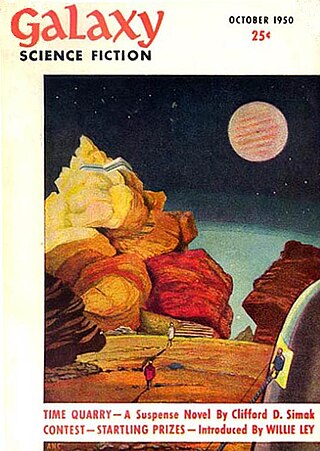
Galaxy Science Fiction was an American digest-size science fiction magazine, published in Boston from 1950 to 1980. It was founded by a French-Italian company, World Editions, which was looking to break into the American market. World Editions hired as editor H. L. Gold, who rapidly made Galaxy the leading science fiction magazine of its time, focusing on stories about social issues rather than technology.

Lester del Rey was an American science fiction author and editor. He was the author of many books in the juvenile Winston Science Fiction series, and the editor at Del Rey Books, the fantasy and science fiction imprint of Ballantine Books, along with his fourth wife Judy-Lynn del Rey.

The Magazine of Fantasy & Science Fiction is a U.S. fantasy and science fiction magazine, first published in 1949 by Mystery House, a subsidiary of Lawrence Spivak's Mercury Press. Editors Anthony Boucher and J. Francis McComas had approached Spivak in the mid-1940s about creating a fantasy companion to Spivak's existing mystery title, Ellery Queen's Mystery Magazine. The first issue was titled The Magazine of Fantasy, but the decision was quickly made to include science fiction as well as fantasy, and the title was changed correspondingly with the second issue. F&SF was quite different in presentation from the existing science fiction magazines of the day, most of which were in pulp format: it had no interior illustrations, no letter column, and text in a single-column format, which in the opinion of science fiction historian Mike Ashley "set F&SF apart, giving it the air and authority of a superior magazine".

Science Fantasy, which also appeared under the titles Impulse and SF Impulse, was a British fantasy and science fiction magazine, launched in 1950 by Nova Publications as a companion to Nova's New Worlds. Walter Gillings was editor for the first two issues, and was then replaced by John Carnell, the editor of New Worlds, as a cost-saving measure. Carnell edited both magazines until Nova went out of business in early 1964. The titles were acquired by Roberts & Vinter, who hired Kyril Bonfiglioli to edit Science Fantasy; Bonfiglioli changed the title to Impulse in early 1966, but the new title led to confusion with the distributors and sales fell, though the magazine remained profitable. The title was changed again to SF Impulse for the last few issues. Science Fantasy ceased publication the following year, when Roberts & Vinter came under financial pressure after their printer went bankrupt.

Unknown was an American pulp fantasy fiction magazine, published from 1939 to 1943 by Street & Smith, and edited by John W. Campbell. Unknown was a companion to Street & Smith's science fiction pulp, Astounding Science Fiction, which was also edited by Campbell at the time; many authors and illustrators contributed to both magazines. The leading fantasy magazine in the 1930s was Weird Tales, which focused on shock and horror. Campbell wanted to publish a fantasy magazine with more finesse and humor than Weird Tales, and put his plans into action when Eric Frank Russell sent him the manuscript of his novel Sinister Barrier, about aliens who own the human race. Unknown's first issue appeared in March 1939; in addition to Sinister Barrier, it included H. L. Gold's "Trouble With Water", a humorous fantasy about a New Yorker who meets a water gnome. Gold's story was the first of many in Unknown to combine commonplace reality with the fantastic.
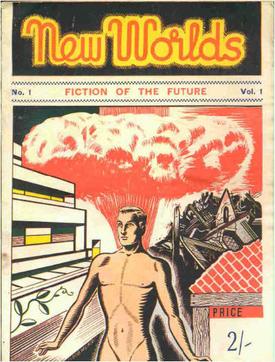
New Worlds was a British science fiction magazine that began in 1936 as a fanzine called Novae Terrae. John Carnell, who became Novae Terrae's editor in 1939, renamed it New Worlds that year. He was instrumental in turning it into a professional publication in 1946 and was the first editor of the new incarnation. It became the leading UK science fiction magazine; the period to 1960 has been described by science fiction historian Mike Ashley as the magazine's "Golden Age".

Infinity Science Fiction was an American science fiction magazine, edited by Larry T. Shaw, and published by Royal Publications. The first issue, which appeared in November 1955, included Arthur C. Clarke's "The Star", a story about a planet destroyed by a nova that turns out to have been the Star of Bethlehem; it won the Hugo Award for that year. Shaw obtained stories from some of the leading writers of the day, including Brian Aldiss, Isaac Asimov, and Robert Sheckley, but the material was of variable quality. In 1958 Irwin Stein, the owner of Royal Publications, decided to shut down Infinity; the last issue was dated November 1958.
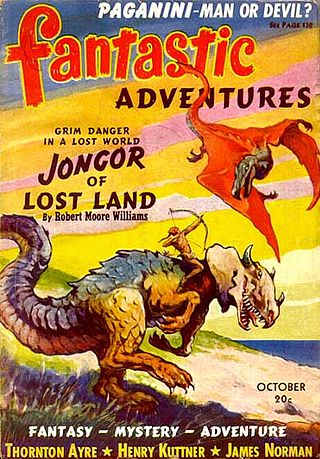
Fantastic Adventures was an American pulp fantasy and science fiction magazine, published from 1939 to 1953 by Ziff-Davis. It was initially edited by Raymond A. Palmer, who was also the editor of Amazing Stories, Ziff-Davis's other science fiction title. The first nine issues were in bedsheet format, but in June 1940 the magazine switched to a standard pulp size. It was almost cancelled at the end of 1940, but the October 1940 issue enjoyed unexpectedly good sales, helped by a strong cover by J. Allen St. John for Robert Moore Williams' Jongor of Lost Land. By May 1941 the magazine was on a regular monthly schedule. Historians of science fiction consider that Palmer was unable to maintain a consistently high standard of fiction, but Fantastic Adventures soon developed a reputation for light-hearted and whimsical stories. Much of the material was written by a small group of writers under both their own names and house names. The cover art, like those of many other pulps of the era, focused on beautiful women in melodramatic action scenes. One regular cover artist was H.W. McCauley, whose glamorous "MacGirl" covers were popular with the readers, though the emphasis on depictions of attractive and often partly clothed women did draw some objections.
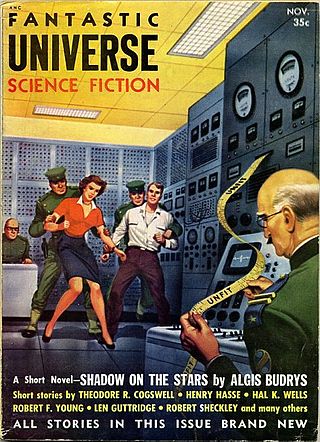
Fantastic Universe was a U.S. science fiction magazine which began publishing in the 1950s. It ran for 69 issues, from June 1953 to March 1960, under two different publishers. It was part of the explosion of science fiction magazine publishing in the 1950s in the United States, and was moderately successful, outlasting almost all of its competitors. The main editors were Leo Margulies (1954–1956) and Hans Stefan Santesson (1956–1960).
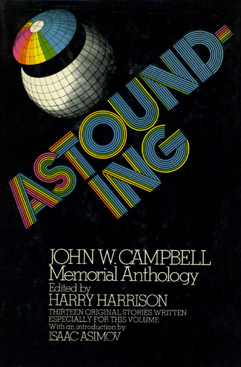
Astounding: John W. Campbell Memorial Anthology is a 1973 anthology honoring American science fiction and fantasy editor John W. Campbell, in the form of an anthology of short stories by various science fiction authors, edited by Harry Harrison. It was first published in hardcover by Random House as a selection of the Science Fiction Book Club, and first published in paperback by Ballantine Books.
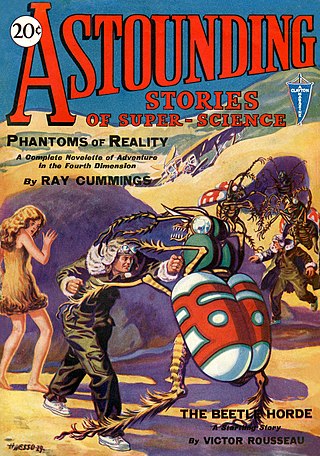
Analog Science Fiction and Fact is an American science fiction magazine published under various titles since 1930. Originally titled Astounding Stories of Super-Science, the first issue was dated January 1930, published by William Clayton, and edited by Harry Bates. Clayton went bankrupt in 1933 and the magazine was sold to Street & Smith. The new editor was F. Orlin Tremaine, who soon made Astounding the leading magazine in the nascent pulp science fiction field, publishing well-regarded stories such as Jack Williamson's Legion of Space and John W. Campbell's "Twilight". At the end of 1937, Campbell took over editorial duties under Tremaine's supervision, and the following year Tremaine was let go, giving Campbell more independence. Over the next few years Campbell published many stories that became classics in the field, including Isaac Asimov's Foundation series, A. E. van Vogt's Slan, and several novels and stories by Robert A. Heinlein. The period beginning with Campbell's editorship is often referred to as the Golden Age of Science Fiction.

Nebula Science Fiction was the first Scottish science fiction magazine. It was published from 1952 to 1959, and was edited by Peter Hamilton, a young Scot who was able to take advantage of spare capacity at his parents' printing company, Crownpoint, to launch the magazine. Because Hamilton could only print Nebula when Crownpoint had no other work, the schedule was initially erratic. In 1955 he moved the printing to a Dublin-based firm, and the schedule became a little more regular, with a steady monthly run beginning in 1958 that lasted into the following year. Nebula's circulation was international, with only a quarter of the sales in the United Kingdom; this led to disaster when South Africa and Australia imposed import controls on foreign periodicals at the end of the 1950s. Excise duties imposed in the UK added to Hamilton's financial burdens, and he was rapidly forced to close the magazine. The last issue was dated June 1959.
Worlds Beyond was an American digest magazine of science fiction and fantasy fiction in 1950 and 1951. The magazine only issued three monthly issues, from December 1950 to February 1951, but is notable for having printed stories by Cyril M. Kornbluth, Jack Vance, Mack Reynolds, Graham Greene, John Christopher, Lester del Rey, Judith Merril, William Tenn and others.

"...and some were human." is the first story collection by science fiction writer Lester del Rey, originally published in hardcover by Prime Press in 1948 in an edition of 3,050 copies if which 50 were specially bound, slipcased and signed by the author. The stories first appeared in Astounding and Unknown. An abridged paperback edition, including only eight of the twelve stories, was issued by Ballantine Books in 1961. A Spanish translation, reportedly dropping only one story, appeared in 1957.
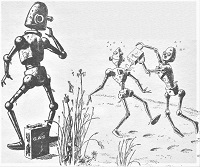
"Internal Combustion" is a classic science fiction robot story by L. Sprague de Camp. It was first published in the magazine Infinity Science Fiction for February, 1956. It first appeared in book form in the collection A Gun for Dinosaur and Other Imaginative Tales ; it later appeared in the anthologies Souls in Metal and Top Science Fiction: The Authors' Choice. The story has been translated into German.

The Legend Book of Science Fiction is an anthology of science fiction short works edited by Gardner Dozois. It was first published in hardcover and trade paperback by Legend in July 1991. The first American edition was issued in hardcover under the variant title Modern Classics of Science Fiction by St. Martin’s Press in February 1992, with a trade paperback edition following from the same publisher in February 1993; the same firm also produced a hardcover book club edition together with the Science Fiction Book Club in April 1992.

The Best of Leigh Brackett is a collection of science fiction short stories by American author Leigh Brackett, edited by Edmond Hamilton. It was first published in hardcover by Nelson Doubleday in July 1977 and in paperback by Ballantine Books in September of the same year as a volume in its Classic Library of Science Fiction. A second hardcover edition was issued by Garland Publishing in March 1983, and Del Rey/Ballantine reprinted the paperback edition in June 1986. The book has been translated into German.

The Best of Lester del Rey is a collection of science fiction short stories by American author Lester del Rey. It was first published in paperback by Del Rey/Ballantine in September 1978 as a volume in its Classic Library of Science Fiction, with a Science Fiction Book Club hardcover edition following in December of the same year. It was reprinted by Del Rey Books in March 1986, February 1995, and June 2000. The book has been translated into German.

The Best of Frederik Pohl is a collection of science fiction short stories by American author Frederik Pohl, edited by Lester del Rey. It was first published in hardcover by Nelson Doubleday in March 1975 as a selection of its Science Fiction Book Club, and in paperback by Ballantine Books in June of the same year as a volume in its Classic Library of Science Fiction, and reprinted in April 1976. The book was reissued in hardcover by Taplinger in 1977. The first British edition was issued in Hardcover in January 1977 by Sidgwick & Jackson, which later gathered it together with The Best of Harry Harrison (1976) into the omnibus volume Science Fiction Special 29 (1978). It has also been translated into Italian and German.

Between 1952 and 1954, John Raymond published four digest-size science fiction and fantasy magazines. Raymond was an American publisher of men's magazines who knew little about science fiction, but the field's rapid growth and a distributor's recommendation prompted him to pursue the genre. Raymond consulted and then hired Lester del Rey to edit the first magazine, Space Science Fiction, which appeared in May 1952. Following a second distributor's suggestion that year, Raymond launched Science Fiction Adventures, which del Rey again edited, but under an alias. In 1953, Raymond gave del Rey two more magazines to edit: Rocket Stories, which targeted a younger audience, and Fantasy Magazine, which published fantasy rather than science fiction.


















